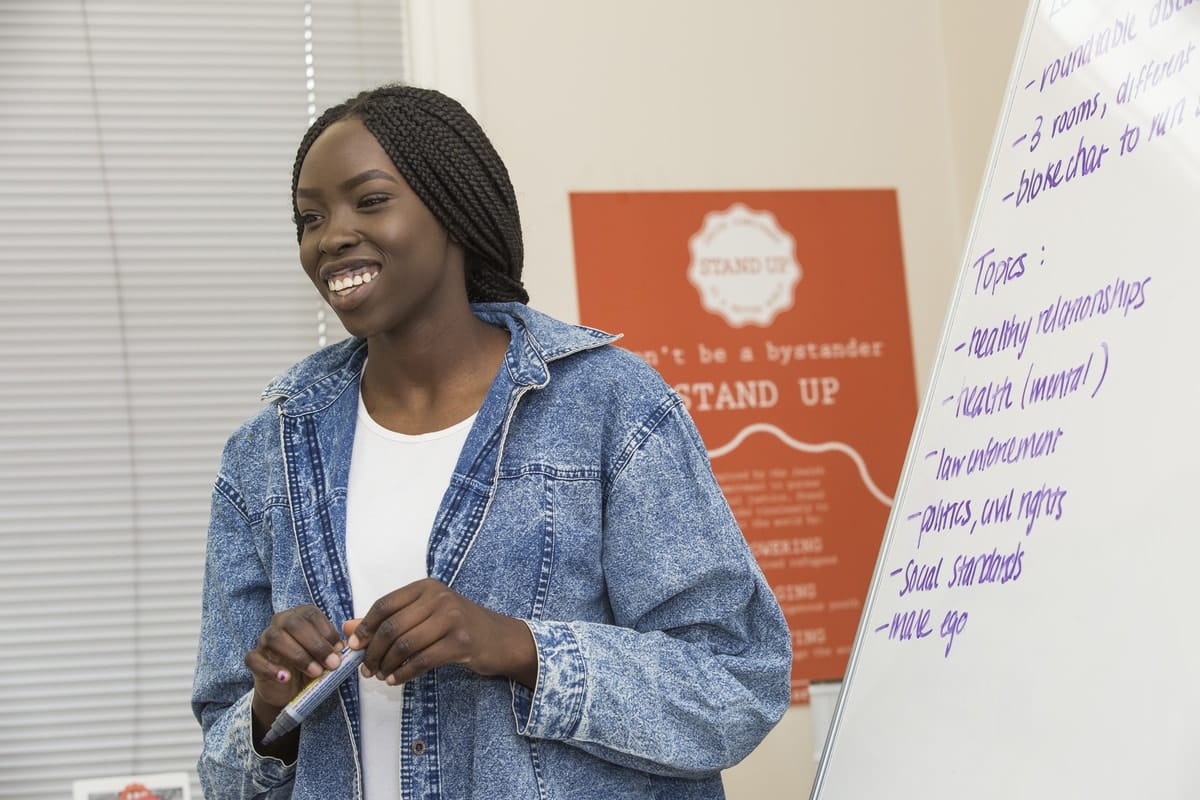
Everyday racism at school feels like being punched, according to Year 12 student Shema, originally from Sudan. “If you get punched multiple times by racism, you’re bruised. You keep getting bruised. You keep getting hurt. You don’t have time to heal. You become weak, and at some point, you are not able to fight back.”
And the best way to tackle racism, she says, is for people in positions of power to unite with the people who experience it.
Everyday racism at school feels like being punched.
According to my research that looks at the experiences of Australian Sudanese and South Sudanese youths as they transition to adulthood, this isn’t happening.
For the past three years, Shema has joined 25 other young people from African backgrounds at a weekly education youth program called iCan. This program is offered by Stand Up, which is a Jewish non-for-profit community organisation that works with disadvantaged communities in Australia.
It’s been a real privilege to be part of the leadership program, which the students can opt into.
"[Racism is] like a norm. Especially for students of colour. Teachers think they can easily target us.”
In our regular sessions, we often talk about what racism looks like — a casual slur from a teacher that doesn’t bear repeating, a threat from another student, a reference that African students are too loud and disruptive, school inaction when issues are raised.
“Racism in Australian schools is not a fake story. It’s real,” Shema says. Year 11 student Aza says: “In our school, racism is everywhere.” Amara, also in Year 11: “It’s kind of like a norm. Especially for students of colour. Teachers think they can easily target us.”
Not surprisingly, these experiences impact student engagement, educational outcomes and long-term wellbeing.
Twice as likely to experience discrimination
Studies about Australian schools have found they largely remain culturally homogeneous spaces, underpinned by Anglo-Celtic norms. Deviations from this norm can make students from certain socio-cultural backgrounds vulnerable to marginalisation at school. A recent large-scale study found students from non-European backgrounds were twice as likely to experience discrimination.
My research has found discrimination against Australian Sudanese and South Sudanese students is largely based on race, and influenced by deficit perspectives of these students. The recent negative public and political attention regarding young people from these communities has a big impact.
Students report they can see a difference in the way teachers interact with them, that expectations are lower for African students, and that behaviour acceptable for others is called out for them. This leads to students disengaging with school, and impedes future social and economic prosperity as these young people become adults. For many of these young people, this impacts their overall feelings of belonging as Australians in Australia.
Why it’s important to listen to the stories
The Age reported that one in five students from African descent has been threatened by another student. Every one of these students has a story. It’s in listening to the stories that we can start to find solutions.
These stories offer invaluable insights about the lived experiences of young people from these communities, and as such are integral to addressing issues of racism in Australian schools. To do this, we need to create space and opportunity for young people to express their stories and to be heard in meaningful ways.
According to Year 12 student Praise, we need to be mindful of the power dynamics that are at play. “Some people are not as confident. The people they have to advocate against are in a higher position. It can be intimidating.”
Leadership programs can help address this, and build confidence, trust and enthusiasm to be part of the conversation, says iCan coordinator Julia Goldberg,
“[It creates] a space which is solely for the purpose of letting students share their opinions and building their capacity to do so in a more public forum,” she says.
Giving young students a voice
Praise says the only way to solve the problem is for people to listen. “It’s great to have other people speaking on your behalf, but what is the point of having someone speak on your behalf if they’re not the ones that have to live those experiences.”
Hosna is a first-year university student and a graduate of the leadership program. She recently participated in a think tank addressing social issues experienced by Australian Sudanese and South Sudanese youths in Victoria with politicians, academics and other members from her community.
“It gave me so much confidence, speaking to people that could listen to me and understand where I was coming from.
“I was thinking, how do people make decisions, and all these things, when there aren’t youth involved?”
'We cannot solve the problem of racism by ourselves'
While the experiences of Australian youth from African backgrounds is integral to addressing racism, it can’t be left up to them to solve the problem on their own, says Praise.
“In 2019, as a black woman, it’s not my responsibility to educate people about what is acceptable and what is not acceptable. It also falls on white people, to self-reflect, and say, ‘Maybe what I’m doing comes from a position of privilege’.”





